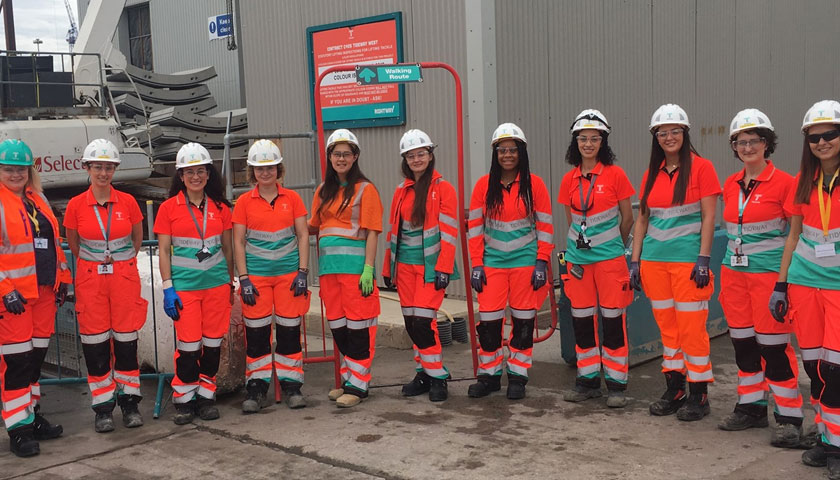A century after Rachel Parsons helped found the Women’s Engineering Society (WES) and became its first president, a tunnelling machine named in her honour has started digging the super sewer in Fulham.
To celebrate International Women in Engineering Day yesterday the chief executive of WES, Elizabeth Donnelly, visited Tideway’s site in Fulham to see the machine named after her organisation’s first president and to meet some of the females working on the Thames Tideway Tunnel.
The TBM digging the west section of London’s super sewer has started tunnelling from Carnwath Road, building part of the new 25km tunnel that will tackle sewage pollution in the River Thames.
Rachel was chosen as part of a public campaign to name Tideway’s six TBMs after inspirational women who lived or worked in the areas where Tideway is working. As well as helping set up the WES in June 1919, Rachel Parsons was one of a group of eight women who started an engineering company in Fulham where all the employees were women.
Elizabeth said: “The Women’s Engineering Society is delighted that Tideway has named its TBMs after inspirational women. We are particularly honoured that it is celebrating our first President Rachel Parsons in our Centenary year. Tideway is transforming our sewage network and WES is proud that we continue to work with inspiring companies and women who will transform our future.”
Sally Cox, project director for the west section of the tunnel, said: “In the centenary year of the Women’s Engineering Society, we are delighted to recognise the work of Rachel Parsons in leading the way for women in engineering and construction. I have worked in the industry for years and have seen the huge range of opportunities it offers, as well as the challenges it can pose for women.
“We owe a huge amount to Rachel and the WES for their work in highlighting the invaluable role women have and I hope by recognising and celebrating this, we can continue to inspire young women into careers in the industry.”
In 1910, Rachel become one of the first three women to study Mechanical Sciences at the University of Cambridge, although – like all women until 1948 – she could not graduate with a degree or become a full member of the University.
When the First World War broke out, she replaced her brother as a director on the board of their father’s Parsons Marine Steam Turbine Company. In particular, she oversaw the recruitment and training of women to replace the men who had left to join the armed forces and campaigned for equal access for all to technical schools and colleges, regardless of gender.
She was among the founders of the Women’s Engineering Society and in 1920 she was one of a group of eight women who founded the engineering company Atalanta Ltd in Fulham Road, where all the employees were women.

